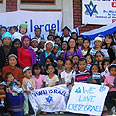
How do you say 'a dreidel' in Kuki?
Bnei Menashe of northeastern India, who claim descent of one of Israel's 10 Lost Tribes, receive new book on laws and customs of Hanukkah in their native tongues of Kuki and Mizo
The volume, which is being published by Shavei Israel, is the first of its kind, and 1,000 copies have already been distributed throughout Mizoram and Manipur, the northeastern Indian states where the bulk of the Bnei Menashe currently live.

The booklet's cover (Photo courtesy of Shavei Israel)
For most of their sojourn in exile, the Bnei Menashe did not observe Hanukkah nor were they aware of its existence until the modern era. This, due to a very simple reason: Their ancestors were said to be exiled from the land of Israel some 560 years before the historical events which Hanukkah commemorates.
"We are proud to publish this very special book on Hanukkah for the Bnei Menashe, which aims at helping them to gain a deeper understanding of the laws and customs of the festival," said Shavei Israel Chairman and Founder Michael Freund, adding, "the Bnei Menashe are anxiously awaiting the passage of a decision by Israel's cabinet to allow them all to come to Israel. We hope that this book will raise their spirits during the holiday and we pray that their dream to come to Israel will soon be fulfilled".
The Bnei Menashe (Hebrew for "sons of Manasseh") claim descent from one of the 10 Lost Tribes of Israel, who were sent into exile by the Assyrian Empire more than 27 centuries ago. They live in India's northeastern border states of Manipur and Mizoram.
Their ancestors wandered through Central Asia and the Far East for centuries, before settling in what is now northeastern India, along the border with Burma and Bangladesh.
Throughout their exile, the Bnei Menashe nonetheless continued to practice Judaism just as their ancestors did, including observing the Shabbat, keeping kosher, celebrating the festivals and following the laws of family purity. And they continued to nourish the dream of one day returning to the land of their ancestors, the Land of Israel.
In recent years, "Shavei Israel" has brought some 1,500 Bnei Menashe back home to Zion, including 230 in the past year alone who settled in the Upper Galilee. Another 7,000 still remain in India, waiting for the day when they too will be able to return to Israel and the Jewish people.










